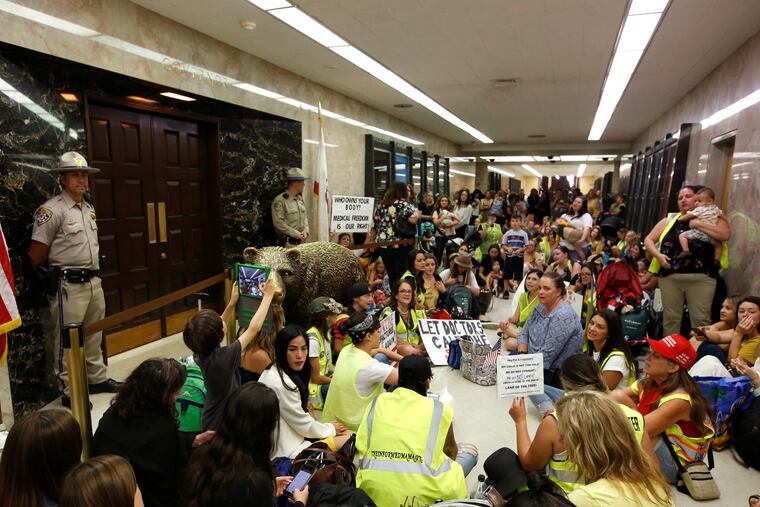Vaccines should not become a partisan issue | Opinion
Politicizing and polarizing this issue would do a tremendous amount of damage that would be tough to reverse.

The United States is, at the moment of this writing, experiencing four different measles outbreaks. Communities ranging from New York City to Michigan, Washington state, and California have been affected in recent months. According to the CDC, the first five months of 2019 saw the greatest number of cases of measles reported in over a quarter of a century.
Measles can be a very dangerous disease, especially for children. It can cause pneumonia, hearing loss, inflammation of the brain and, in extreme cases, death. It is also one of the most contagious viruses on the planet. Good news is that it is entirely preventable: there exists a very safe vaccine, that, if properly administered in two doses, is about 97% effective at preventing measles.
Vaccination coverage, or the proportion of children immunized for measles, is high in the United States. But national numbers tend to disguise pockets across the country with large numbers of unvaccinated kids. These communities tend to be in one of the 18 states that allow parents to exempt their children from required vaccination on religious or personal belief grounds.
In the aftermath of the current outbreaks, many states are, understandably, tightening laws around vaccinations. Legislators see a public health crisis, and they are doing what they can to stop current, and prevent future, outbreaks. New York, for example, just recently outlawed religious exemptions for vaccinations. Washington state removed personal belief exemptions. Lawmakers in New Jersey, Oregon, and several other states are working on their own bills eliminating exemptions.
As these states move to increase their vaccination coverage by limiting the ability of parents to exempt their children from various vaccines, we’re witnessing the politicization of this issue. That means that many of these bills are introduced by Democratic politicians, only to be opposed by Republicans. This is a dangerous development, because politicians frequently shape public opinion. If Democrats and Republicans take opposing positions on vaccines, we will likely see a polarization on this issue among the public, much like we saw on climate change. That might lead to plummeting rates of vaccine coverage, an outcome no one should want.
So, what can be done to avoid that? First, media and lawmakers alike should acknowledge there exists a cross-ideological consensus supporting vaccines in the United States. While polling on this topic is sparse, existing data paint a clear picture of consensus on vaccine safety and the importance of government action to protect the public through vaccination. A recent poll, for example, found that 72% of Americans believe that parents should be required to vaccinate their children for diseases like measles.
More detailed polling from the Pew Research Center back in 2016 found similar levels of support: 82% of Americans believe that healthy children should be vaccinated to attend school because of potential health risks to others. This view holds among people of different ages, religious backgrounds, or parenthood status.
Most importantly, it also holds across political parties. There are no distinguishable differences between Republicans and Democrats on that front, consistent with previous Pew polling. A small ideological gap exists, though, with 73% of conservatives supporting school-based vaccine requirement, and 90% of Democrats.
These findings highlight a strong consensus. But they also highlight existing ideological differences that could be exploited to polarize the public. Politicians who vote against laws the public overwhelmingly supports are doing a disservice to their constituents by prioritizing the outsized voices of the small but vocal group of anti-vaccine activists.
The media have a responsibility here, too. Journalists should ensure that vaccinations are not made into a topic of political competition. Highlighting party line votes on vaccines, or amplifying extreme voices, like that of Sen. Rand Paul, to pit against pro-vaccine Democrats, can polarize public opinion and ultimately lower vaccination rates. Instead, the media should highlight that most Americans, regardless of partisan affiliation, support vaccination policies that protect their communities from diseases. Republican voices, like that of Sen. Bill Cassidy, highlighting the importance of vaccinations should be amplified.
Maintaining our consensus on vaccines should be a public health priority. Politicizing and polarizing this issue would do a tremendous amount of damage that would be tough to reverse. It is difficult to imagine maintaining our high vaccination levels in a society where vaccines become yet another issue on which Americans split along party lines.
Dominik Stecula is a postdoctoral fellow at the University of Pennsylvania’s Annenberg Public Policy Center.